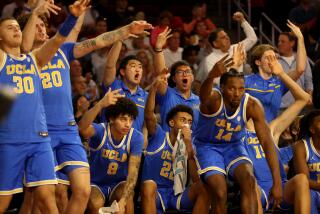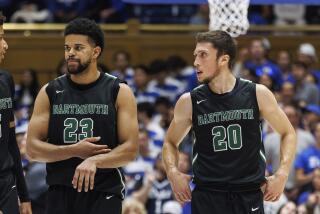Black Boycott Still in Works : College basketball: Conferences and networks plot strategy for weekend. Northridge’s Cassidy calls BCA a “splinter group.”
- Share via
With some kind of boycott affecting college basketball games possible as early as Saturday, commissioners and representatives of 33 conferences this afternoon will discuss their strategy regarding the planned action by the Black Coaches Assn.
Pacific 10 Conference athletic directors and senior administrators will hold a similar conference call Friday to plan the conference’s posture regarding a potential boycott.
Tom Hansen, Pac-10 commissioner, said he would prefer that there be no interruption in the season.
“I would hope, with conference competition involved, the players are going to compete,” Hansen said. “For coaches, there’s always next year. Players only have a brief playing period.”
Jim Haney, executive director of the National Assn. of Basketball Coaches, said he is trying to get the organization’s 16-member board together on a conference call to formulate a policy statement.
Pete Cassidy, coach at Cal State Northridge and a member of the NABC, said the BCA should not act alone in calling for a boycott.
“If you get splinter groups that go off in different directions, that’s divisiveness and I’m not in favor of that,” he said. “That’s what I see the Black Coaches Assn. as being, a splinter group. We have a national association of coaches and I’d like to work through that. We should speak as a unit.”
Cassidy went on to say that he was “not in favor of the Black Coaches Assn. or anyone else violating the terms of contracts and agreements that already exist.”
Pepperdine Coach Tom Asbury is also concerned about the way it will appear if all coaches don’t participate in a boycott.
“We’re playing St. Mary’s on Saturday and just suppose (Coach) Ernie Kent participates and I don’t,” Asbury, who is white, said of Kent, who is black. “Then how will it look? I may be more supportive than he is on this, but that’s not how it’s going to look.”
Although the BCA has not said when any action would be taken, many college administrators anticipate that it will happen Saturday, Martin Luther King Jr.’s birthday.
USC Coach George Raveling, a member of the BCA executive committee, said BCA executive director Rudy Washington of Drake will release more information today. But Raveling said Washington will not reveal the nature of the action the BCA plans to take.
“What I can say is that the BCA has voted to boycott, but how and where and what, we aren’t at liberty to say right now,” Raveling said.
Bumper stickers that read “Black Saturday, Support the Black Coaches Association” were available in Raveling’s office two weeks ago.
Five Pac-10 games are scheduled Saturday: UCLA at Washington, USC at Washington State, Stanford at Arizona, California at Arizona State and Oregon State and Oregon.
ESPN, CBS and Prime Ticket are among television outlets with college basketball scheduled for this weekend.
Spokespersons for the three networks said they are prepared to offer alternate programming if a game is canceled because of a boycott.
They also said it is too early to speculate on any financial implications of a boycott. It’s possible that canceled games could be made up later.
Washington State Coach Kelvin Sampson, a BCA member, said he was ready to take some kind of action.
“There comes a point where you have to take a stand,” Sampson said. “A brush fire here or there isn’t going to do anything. We’ve got to have solidarity on this.”
The BCA, which has 61 college basketball coaches in its membership, announced Tuesday that it planned a boycott to protest the decision by the NCAA not to restore the scholarship limit in men’s college basketball to 14 from its current level of 13, though Raveling said the reasons for boycotting go beyond the scholarship issue. The NCAA Presidents Commission strongly opposed altering the scholarship limit.
Minorities are particularly hurt by cutting scholarships, the BCA said.
Cal State Fullerton President Milton Gordon, who voted against adding a scholarship, said the decision wasn’t based on race.
“Absolutely not,” Gordon said. “I talked with a number of my friends (at the convention) about it and the presidents are ultimately responsible for budgets. To me, this has nothing to do whatsoever with race. It’s a cost-containment measure.
“You can especially understand it here in California. We’ve got to consider cost and reign it in,” added Gordon, who is black.
According to Charles Farrell, the director for the fairness in sports committee of the Rev. Jesse Jackson’s Rainbow Coalition, any BCA protest would gain wide support from his group.
Said Farrell: “The Rainbow position, after talking with Rev. Jackson, is that we are definitely in support of this issue, a boycott or whatever action they take.”
A boycott could lead to a team forfeiting a game, although it seems doubtful that coaches in support of the BCA would accept a victory through forfeit. However, there is speculation that a boycott between two teams playing each other might be possible.
Jim Muldoon, assistant commissioner of the Pac-10, addressed how the conference would handle such a scenario. “We don’t know,” he said. “Would we try to reschedule it? I guess you can’t force them to play.”
Because Raveling is a key figure in the BCA, there is much attention being focused on USC.
“Basically right now, it is at a real critical time in the season and as players, we really don’t want to (boycott),” USC senior Mark Boyd said. “But, if we have to, we’ll do what’s best. I don’t think half the players understand what is going on. All we know is that we are going up there and maybe we’ll play or maybe we won’t.”
There is precedent for a boycott, at least by a single coach. In 1989, Georgetown Coach John Thompson skipped two games to protest the NCAA’s elimination of scholarship aid to Proposition 48 athletes. Dick Schultz, then the NCAA executive director, met privately with Thompson, who scored a partial victory at the 1990 NCAA convention when the NCAA decided to allow Proposition 48 athletes to qualify for academic scholarship money, but not athletic scholarship aid.
Times staff writers Mike Hiserman, Scott Miller, Mitch Polin, Danny Robbins, Larry Stewart and Lonnie White contributed to this story.
More to Read
Go beyond the scoreboard
Get the latest on L.A.'s teams in the daily Sports Report newsletter.
You may occasionally receive promotional content from the Los Angeles Times.






